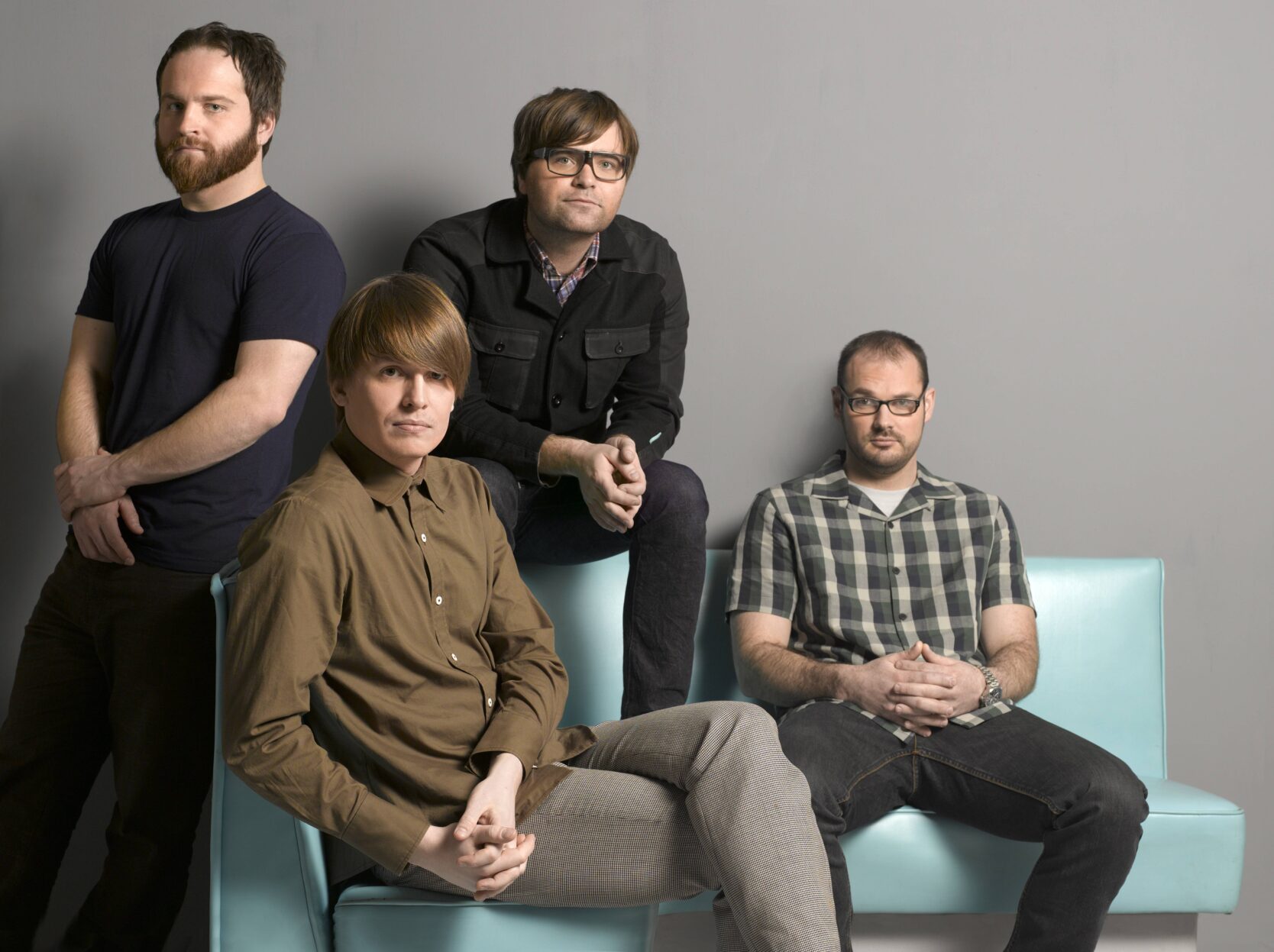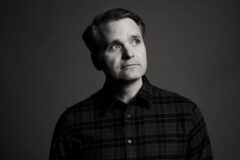There are few bigger indie success stories in the past 20 years than Death Cab for Cutie.
The group, founded in Bellingham, Washington in the mid-’90s, began like many underground acts — with witty and intricate songs recorded on a budget. But they quickly displayed a penchant for radio-friendly rock anthems that tapped into a particular kind of youthful vulnerability. They’re not “emo” exactly, but there’s a good reason why the term stuck — it’s impossible not to feel something when listening to their music. That quality helped them become a household name (as referenced on shows like The O.C.) and eventually a popular staple on terrestrial radio.
On Sept. 16, Death Cab for Cutie release Asphalt Meadows: their 10th album, second as a quintet, and first with producer John Congleton. To mark the occasion, we revisit their catalog to see where it ranks among early triumphs like The Photo Album and Transatlanticism.
10. Codes and Keys (2011)
At the time of making their seventh record, Codes and Keys, guitarist Chris Walla cited Brian Eno’s Another Green World as a reference point, which is palpable in the overall focus on sound above all else. And it’s certainly a very cool-sounding album, whether in the spacey atmosphere of opening track “Home Is a Fire,” the motorik repetition of “Doors Unlocked and Open,” or the minimalist piano intro of “Unobstructed Views.” When compared to the band’s prior effort, Narrow Stairs, Ben Gibbard’s lyrics — on paper, at least — are unusually optimistic and sentimental, written around the time he married Zooey Deschanel. Yet he feels more distant than usual here: perhaps obscured by studio flash, perhaps spread thin by the more haphazard method of recording in eight different locations. This experimental album about domestic bliss never quite lines up right.
9. Thank You For Today (2018)
In a pretty literal sense, Thank You For Today captures a very different band than that of their Barsuk days — only Gibbard and bassist Nick Harmer have remained in the group since 1998’s Something About Airplanes. They’ve also embraced a more polished overall sound since then, though rarely detrimentally so. On Thank You For Today, the presence of synths and a dreamier sonic palette marks another major step in their evolution, wrapping a nostalgic surrealism around Gibbard’s narratives of growing up and the inevitable change that comes with time. It’s often quite pretty, and on tracks such as “Northern Lights” and “I Dreamt We Spoke Again,” more immediate than their previous couple of records. Though there are callbacks to some of the band’s strongest early material, Death Cab very much feel like a different band here — and they embrace that, even if that means a certain spark or emotional impact is muted as a result.
8. Kintsugi (2015)
Co-founder Walla, who’d produced every prior Death album, left the band before they released Kintsugi. (They recruited producer Rich Costey for the project, even though Walla played on the record.) It’s the product of a transition period, the warmly fuzzy aesthetic of their earlier records just a distant memory. And though it’s more streamlined, Kintsugi is also more muted, avoiding some of the stranger decisions of their prior two albums. There’s also no dramatic breakout moment like “A Movie Script Ending” or “Marching Bands of Manhattan.” But there are still some subtly lovely songs here, including “You’ve Haunted Me All My Life” and the stark “Hold No Guns.”
7. Narrow Stairs (2008)
There’s a certain irony about Narrow Stairs, the album following Death Cab’s then-biggest release, being so defeatedly bleak. As each of the band members had entered their 30s, the idea of adulthood being a letdown seemed to weigh heavy, and throughout the album are reminders about how much of a bummer growing up can be, whether it’s the bride making the worst decision of her life in “Cath…” or the pained nostalgia in “No Sunlight.” Still, few bands are better equipped to tackle that kind of disappointment with such graceful immediacy, and in moments like those two highlights, it can be absolutely crushing. With more resources at their disposal, the group attempted some stylistic experiments that feel almost like non-sequiturs, including the Beach Boys homage “You Can Do Better Than Me” and the tabla-driven “Pity and Fear.” While the highs are high, the lows sound like songs that were probably fun to record but less enjoyable on the other side.
6. Asphalt Meadows (2022)
When Death Cab for Cutie released “Roman Candle,” the first single from Asphalt Meadows, they issued a statement about how, despite working remotely at the beginning of COVID-19 lockdown, the album ended up being their most collaborative. They absolutely sound like a band with stronger chemistry, taut and streamlined, with songs more explicitly evoking the post-punk of New Order and The Cure. The approach suits them, echoing the dynamics of earlier records like The Photo Album while allowing themselves room for exploration, with added punch from producer John Congleton. Where some of their ‘10s output led them in questionable directions, here their wilder ideas all pretty much land, whether the thunderous crunch of “I Don’t Know How I Survive,” the distorted electronic pulse of “Roman Candles,” or the spoken-word post-rock majesty of “Foxglove Through the Clearcut.” While Death Cab continue to seek new frontiers, Gibbard’s delivery, earnest and romantically melancholy, still tugs at the heartstrings.
5. Something About Airplanes (1998)
Gibbard has admitted that when Death Cab for Cutie released their debut album, 1998’s Something About Airplanes — which followed the You Can Play These Songs With Chords cassette, featuring lo-fi, demo-quality takes on several of these songs — he had been listening to Built to Spill’s Perfect From Now On nonstop. The influence is fairly transparent, whether through the slow, graceful arpeggios of opener “Bend to Squares” or the scruffy melodies of “Your Bruise.” Still, the band’s knack for taut, hook-driven indie pop is front and center, showcasing glimmers of greatness on standout tracks “President of What?,” “Pictures in an Exhibition” and the uncharacteristically sinister “Champagne From a Paper Cup.”
4. Plans (2005)
Death Cab had already made mainstream inroads before leaving indie Barsuk for major label Atlantic, making the polish of their fifth album, Plans, a logical step forward from Transatlanticism. Rather than pushing themselves into even more progressive concepts, they expanded relatively simple pop songs (“Soul Meets Body,” “Your Heart is an Empty Room”) through bountiful arrangements and immersive production. The flipside is that it leaves tracks like “Someday You Will Be Loved,” one of Gibbard’s admitted least favorite songs he’s written, sounding even more hollow as a result. But when they go all-in on a big idea, like the stunning opener “Marching Bands of Manhattan,” they tease the higher reaches of their songwriting. Despite being so lush, the album also features “I Will Follow You Into the Dark,” featuring only Gibbard’s voice and acoustic guitar, recorded on a single mic. The irony? To date, it’s still their most successful single, going double platinum in the U.S.
3. The Photo Album (2001)
The progression between Death Cab for Cutie’s second and third albums seems dramatic. But it’s more the result of the latter’s heightened visibility than anything the band did deliberately. Much like We Have the Facts and We’re Voting Yes, The Photo Album was produced by Walla, and the songs retain their melancholy haze despite more prominent hooks on a handful of key moments, particularly the dramatic swell of “A Movie Script Ending” and the fuzzy indie pop crunch of “I Was a Kaleidoscope.” But Death Cab went primetime in the aftermath of this album’s release, with several of their songs featured on The O.C. and thus reaching an even wider audience. The differences between this album and its comparatively strong predecessors are mostly subtle. Its biggest revelation: proving that the band had hits in them after all.
2. We Have the Facts and We’re Voting Yes (2000)
In just over a year, Death Cab showed a remarkable growth with second album We Have the Facts and We’re Voting Yes. No longer quite as transparent about their Pacific Northwest indie influences, they eased into a more spacious and elegant form of songwriting just a few BPMs higher than Low or Bedhead, and Gibbard no longer couched his lyrics in oblique abstraction. These are songs of love and heartbreak and regret — the usual for pop music, but when paired with a climactic rise on a standout like “Company Calls Epilogue,” the result is more affecting and devastating. An early and stunning breakthrough for a band still carving out their niche.
1. Transatlanticism (2003)
Death Cab for Cutie nearly broke up in 2001 while touring behind The Photo Album. The strain of four straight years of constant playing, writing, and recording had caught up to them, and they did the reasonable thing after the trek by taking a break. During their time apart, Gibbard worked with Jimmy Tamborello on The Postal Service’s Give Up, an electronic pop project that unforeseeably became Sub Pop’s second-best-selling album ever. Still riding that high, Gibbard and company reconvened for their fourth record, making an effort not to rush after a relatively stressful experience making The Photo Album.
The finished product remains their greatest accomplishment, fully realizing the potential of Death Cab’s earnest accessibility while widening the scope and ambition. Opener “The New Year” sounds like Death Cab amplified and magnified fourfold, a rush reinforced by the titular, seven-minute centerpiece. Every detail on this album feels carefully crafted and deliberate, but often subtle, like the squeaky wheel that loops through “Lightness” or the clog-dance handclaps in “The Sound of Settling.” On Transatlanticism, Death Cab held nothing back — musically or emotionally. It’s their masterpiece.





